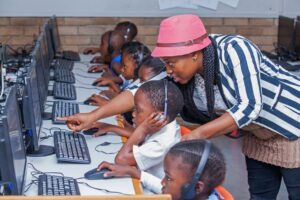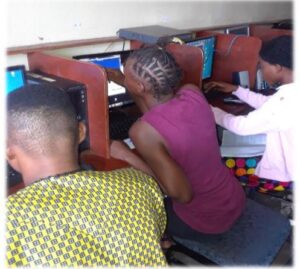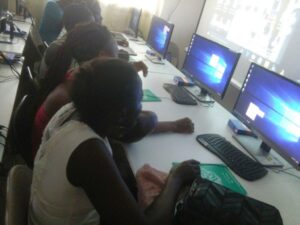26-year Abdulai Kemoh Conteh is the Founder & CVO (Chief Visionary Officer) of IT Specialists Without Boarders, an innovative idea whose predominant mission is to take ICT to the doorstep of the underprivileged through ICT educational programs, research, training, workshops, and scholarship grants. Born and growing up in Freetown during and after the long decade of civil war, Abdulai Kemoh Conteh have always embarked on developing his ICT skills. At a very tender age, Abdulai Kemoh Conteh had an interest in ICT, Visiting his friend’s house, He could use any opportunity whenever he had access to his friend’s computer to learn, ask questions and do deep research for the decade absence of the use of ICT in our educational system. In 2010, before taking the Basic Education Certificate Examination (BECE). He enrolled at the Youth Development Movement training center to study ICT where he completed and got his very first certificate in (Microsoft Applications Packages). He then enrolled at the IPAM University of Sierra Leone to pursue Cisco Networking in 2014 just after he sat his West Africa Senior Secondary Certificate Examination (WASSCE), and in 2017 he got admitted at UNITECH formally known as IAMTECT to pursue BSc (Honors) in Networking & Telecommunications. But due to the illness of his father who supported his education, he had to drop out of the course.

However, just after a year of him dropping out of university, in 2018, Abdulai Kemoh Conteh had the idea of developing IT Specialists Without Borders whose predominant mission is to take ICT to the doorstep of the underprivileged through ICT educational programs, research, training, workshops, and scholarships grant. And the path of him actualizing this mission, He had to immediately draft a compromising vision. As he envisions increasing the access of technology for people around the world, regardless of age, tribe, religion, political affiliation, and neither anyone’s geographical location, with Sierra Leone as his starting point, wherein the use of ICT in Schools is yet to take effect for more than a decade now. Whilst, mitigating the gap between skill acquired by students in their course study and the market requirement so that they have job-ready after graduating from IT institutions/universities; thereby given them training that’s relevant and not outdated which foster innovation and creativity instead of just producing well – versed professionals in the field of ICT without given back to their societies, communities, and the world at large.

In 2019, owing to his passion for giving back to society and the world at large, Abdulai Kemoh Conteh drafted a project called “The inclusion of ICT in Schools” which goes beyond implementing it in schools around the capital (Freetown) and for the rest of the schools within the 16 districts of Sierra Leone, in achieving these short & long term goals & objectives by 2030.
SHORT–TERM GOALS & OBJECTIVES
Empowering all school-going pupils, unemployed youths, and teachers to be technological inclined with all types of technical courses and tools
Empowering pupils and unemployed youths to compete and merge along with the global technological job market courses
Standardizing the educational curricular with the inclusion of ICT to be taught as a core subject in schools and sat to during major examinations like; BECE/WASSCE.
Drafting an ICT educational policy and strategic plan to serve as the road map for the successful implementation of ICT in the educational system.
Installing standardize computer labs to enhance practical ICT training in all schools rather than just paying attention to the theoretical aspect which cannot record any success in the end.

LONG – TERM GOALS & OBJECTIVES
Technologically equipping all schools within the 16 districts of Sierra Lone with; (Standard computer labs, Learning base internet connectivity, sustainable and reliable electricity connection)
Empowering pupils and unemployed youths in Sierra Leone to be creative and innovative through the use of ICT tools.
Establishing coding camps around all schools in Sierra Leone for pupils to become computer programmers at an early stage of their academic journey, to help them choose it as a career path, profession, or area of specialization if they so desire.
Setting up the organization’s forums & chapters around IT University campuses, inclusive of schools, and ICT institutions/universities to jointly work together in bridging the digital gap that has been coexisting in Sierra Leone for more than a decade now.
Partnering with leading ICT organizations/institutions in and out of Sierra Leone to jointly work together and help accomplish the organization’s mission & vision.
Conducting a yearly ICT competition and award amongst (pupils in schools & ICT universities across the 16 district of Sierra Leone), to create positive awareness about the importance of ICT to the majority of parents who sees it as a career path for drop-outs. As a way of encouraging them to sponsor their children in offering ICT courses like; (Cyber Security, Networking, Coding, Ethical hacking, etc.)
Even though to date he’s yet to secure sponsorship and just to see that this fight of his comes to reality, He then created and launched a gofundme campaign to raise funds to be able to buy equipment and other costs associated with the swift implementation of this project (“The Inclusion of ICT in Schools”). Whose contexts is stated below;

A country recovering from a devastating 10 years civil war and an Ebola outbreak in 2014 that has destroyed its entire infrastructure, Sierra Leone still has huge gaps in both ICT policies (National & Educational), which has gotten a negative implication for the effective use of ICT most especially in the educational system.
As such; information and communication technology (ICT) plays a very significant role in the advancement of any nation; through digital economic productivity which enhances the delivery of public and private services and achieving broad socio-economic goals in sectors like; education, health care, employment, and human social capacity development. As a result of this factual reality, countries are advancing their National & Educational ICT policies every day to underpin growth in a variety of socio-economic sectors which helps them stand tall in terms of development and competition. Apparently, given the rapid evolution of ICT in the 21st Century due to a variety of newly emerging technologies, it is no doubt that systematic examination and evaluation of comprehensive policies and strategies are essential. In the education sector, policy-makers are yet to realize that access to ICT can help individuals to compete in a global community. Henceforth, the argument that ICT has a significant effect throughout the educational system is because;
It facilitates learning and provides students with new sets of technological skills;
It reaches students with poor or no access (especially those in rural and remote villages);
It facilitates and improves the training of teachers to be technologically inclined; and
Minimizes the costs associated with the method of traditional teaching and delivery of notes in
making it digitalized.

However, it’s beyond this unprecedented backdrop a non – for – profit making organization of such was established on the scope of addressing the arising ICT challenges which drive towards increasing its technological impact on human lives, inclusive of schools, remote and underprivileged communities within the 16 districts of Sierra Leone, with thousands of school-going pupils as our primary beneficiaries.
LIST OF PROJECT ACTIVITIES
- Survey- Executing a thorough research mechanism to know how many schools already have computer labs, those offering ICT as a subject, and those that are not yet E-ready to adopt ICT
- Drafting of the ICT Educational Policy, ICT Curriculum & Strategic Plan- Involving all key players in the process. i.e. Ministry of Education, Head of Schools (Principals, Head Masters & Mistress), Teachers, ICT institutions, both government and non – governmental organizations
- Training of ICT Teachers-Developing a comprehensive ICT training manual to train teachers for to teach the most recent and trending ICT job market courses in their respective classrooms. E.g. Coding, Cybersecurity, Artificial Intelligent (AI), etc.
- Infrastructure- Setting up of standard computer labs in schools. (As the teaching of ICT doesn’t only have to be based on the theoretical aspect, but rather
the practical aspect of it is equally more important
and relevant than theory).








